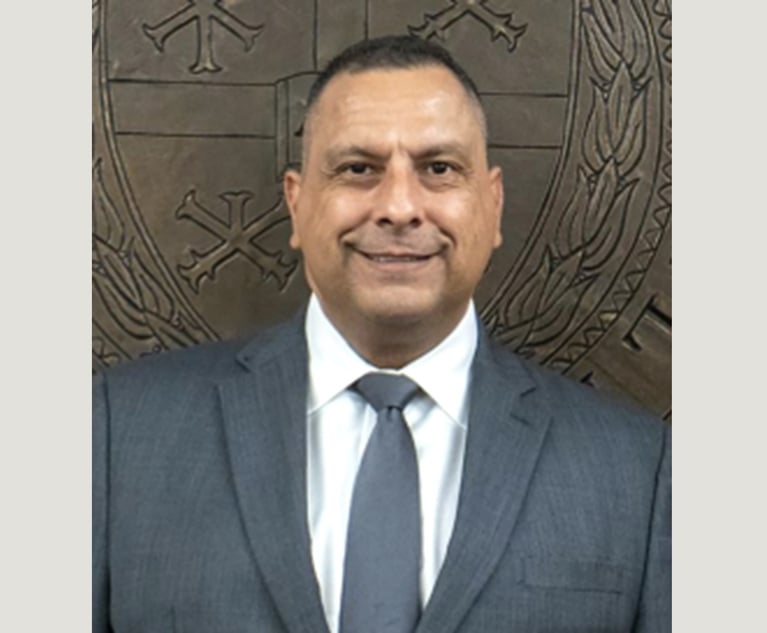State Bar Board Approves Time Limit for Candidates to Collect Petition Signatures
The State Bar of Texas board on Friday approved the nominations of Lisa Blue and Randy Sorrels for president-elect — two lawyers who started their campaigns as petition candidates. But the board then changed the rule for collecting signatures.
January 29, 2018 at 03:09 PM
3 minute read

The State Bar of Texas board on Friday approved the nominations of Lisa Blue and Randy Sorrels for president-elect — two lawyers who started their campaigns as petition candidates. But the board then changed the rule for collecting signatures.
Under the new rule, petition signatures will not be valid if collected more than 180 days prior to the March 1 deadline for candidates to submit petitions to the bar. That means signatures could not be collected by a petition candidate prior to Sept. 2. Under existing rules, a lawyer must collect approximately 5,000 signatures to run as a petition candidate.
State Bar President Tom Vick said that rule “goes hand and hand” with another rule change approved Friday that would move the bar board's selection of president-elect candidates from January to the preceding September.
“The idea is to give all of these candidates about the same amount of time,” said Vick, a partner in Vick & Carney in Weatherford.
Austin solo practitioner Joe Longley, who won election as the bar's president-elect as a petition candidate in 2017, sees the rule in a different light.
“It's a form of candidate suppression of the highest magnitude,” said Longley, who voted against the rule limiting the time for collecting petition signatures.
The board approved the rule by a vote of 32 to 9, according to Lowell Brown, the bar's communications director.
Longley said the change in the rule would give the bar board's nominees an advantage over anyone who runs as a petition candidate. He said that Blue, a partner in Baron and Blue in Dallas, and Sorrels, managing partner of Abraham, Watkins, Nichols, Sorrels, Agosto & Aziz in Houston, began collecting signatures in late August of 2017.
But Steve Fischer, who ran for president-elect as a petition candidate in 2013, said he would not have been able to run if this rule had been in effect at the time he was seeking the office. Fischer, now a solo practitioner in El Paso, said he had started collecting signatures in April 2012, the year before the election. He lost the race but inspired Longley to run.
“This was done to discourage people from running who don't have the imprimatur of the bar,” Fischer said of the new rule on petition signatures.
Fischer said he believes it helps the bar for people who want to run for office to go out and talk to lawyers as he did while collecting signatures.
Vick said he really believes that anybody committed to being a candidate can collect signatures within 180 days, or the individual can seek nomination by the bar's nominations and elections committee.
“There has to be some measure of reason to all of this, or otherwise we would have elections all year round,” Vick said.
The bar board took no action Friday on another proposal that would have the board decide whether to uphold a decision by the executive director to withhold a bar employee's private emails placed on the bar's server if requested by an officer or director of the organization. Vick said the chair of the committee that recommended that policy asked to pull it from the agenda Friday to allow for further study.
This content has been archived. It is available through our partners, LexisNexis® and Bloomberg Law.
To view this content, please continue to their sites.
Not a Lexis Subscriber?
Subscribe Now
Not a Bloomberg Law Subscriber?
Subscribe Now
NOT FOR REPRINT
© 2025 ALM Global, LLC, All Rights Reserved. Request academic re-use from www.copyright.com. All other uses, submit a request to [email protected]. For more information visit Asset & Logo Licensing.
You Might Like
View All
Bracewell Adds Former Pioneer Natural Resources Lawyer to O&G, Energy Transition Practices
2 minute read

Special Counsel Jack Smith Prepares Final Report as Trump Opposes Its Release
4 minute readTrending Stories
- 1New York Court of Appeals Blocks Trump Attempt to Stay Friday Sentencing
- 2'Self-Diagnosed Nickel Allergy' Fails to Find Success in Med-Mal Suit, 8th Circuit Rules
- 3Eversheds Sutherland Adds Hunton Andrews Energy Lawyer With Cross-Border Experience
- 4Balancing Judicial Authority: Understanding Sanctions, Severance, and Interferences
- 5Up in the Air: Boeing’s Deferred Prosecution Saga Continues
Who Got The Work
Michael G. Bongiorno, Andrew Scott Dulberg and Elizabeth E. Driscoll from Wilmer Cutler Pickering Hale and Dorr have stepped in to represent Symbotic Inc., an A.I.-enabled technology platform that focuses on increasing supply chain efficiency, and other defendants in a pending shareholder derivative lawsuit. The case, filed Oct. 2 in Massachusetts District Court by the Brown Law Firm on behalf of Stephen Austen, accuses certain officers and directors of misleading investors in regard to Symbotic's potential for margin growth by failing to disclose that the company was not equipped to timely deploy its systems or manage expenses through project delays. The case, assigned to U.S. District Judge Nathaniel M. Gorton, is 1:24-cv-12522, Austen v. Cohen et al.
Who Got The Work
Edmund Polubinski and Marie Killmond of Davis Polk & Wardwell have entered appearances for data platform software development company MongoDB and other defendants in a pending shareholder derivative lawsuit. The action, filed Oct. 7 in New York Southern District Court by the Brown Law Firm, accuses the company's directors and/or officers of falsely expressing confidence in the company’s restructuring of its sales incentive plan and downplaying the severity of decreases in its upfront commitments. The case is 1:24-cv-07594, Roy v. Ittycheria et al.
Who Got The Work
Amy O. Bruchs and Kurt F. Ellison of Michael Best & Friedrich have entered appearances for Epic Systems Corp. in a pending employment discrimination lawsuit. The suit was filed Sept. 7 in Wisconsin Western District Court by Levine Eisberner LLC and Siri & Glimstad on behalf of a project manager who claims that he was wrongfully terminated after applying for a religious exemption to the defendant's COVID-19 vaccine mandate. The case, assigned to U.S. Magistrate Judge Anita Marie Boor, is 3:24-cv-00630, Secker, Nathan v. Epic Systems Corporation.
Who Got The Work
David X. Sullivan, Thomas J. Finn and Gregory A. Hall from McCarter & English have entered appearances for Sunrun Installation Services in a pending civil rights lawsuit. The complaint was filed Sept. 4 in Connecticut District Court by attorney Robert M. Berke on behalf of former employee George Edward Steins, who was arrested and charged with employing an unregistered home improvement salesperson. The complaint alleges that had Sunrun informed the Connecticut Department of Consumer Protection that the plaintiff's employment had ended in 2017 and that he no longer held Sunrun's home improvement contractor license, he would not have been hit with charges, which were dismissed in May 2024. The case, assigned to U.S. District Judge Jeffrey A. Meyer, is 3:24-cv-01423, Steins v. Sunrun, Inc. et al.
Who Got The Work
Greenberg Traurig shareholder Joshua L. Raskin has entered an appearance for boohoo.com UK Ltd. in a pending patent infringement lawsuit. The suit, filed Sept. 3 in Texas Eastern District Court by Rozier Hardt McDonough on behalf of Alto Dynamics, asserts five patents related to an online shopping platform. The case, assigned to U.S. District Judge Rodney Gilstrap, is 2:24-cv-00719, Alto Dynamics, LLC v. boohoo.com UK Limited.
Featured Firms
Law Offices of Gary Martin Hays & Associates, P.C.
(470) 294-1674
Law Offices of Mark E. Salomone
(857) 444-6468
Smith & Hassler
(713) 739-1250







